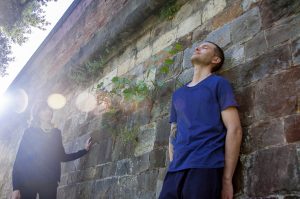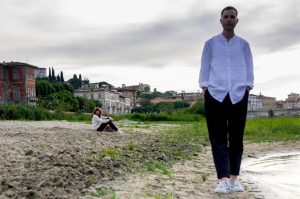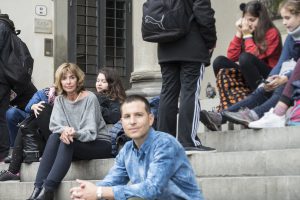
A mom wrote to me: When I hit MY bottom, began to put the focus on ME, and trust my Higher Power, I was finally able to release myself from fear and find true understanding and compassion for my son and myself. When I let go of trying to change and control him, when I granted him the dignity to face his disease on his own terms, it was then – slowly – the miracles began to unfold. Today he has a good job and the fog seems to be lifting, but I have absolutely no sense of what his lifestyle choices are or what tomorrow might bring. His recovery is his own. I cannot live my life based on him, how he looks, how he “seems.” We try to love him as is, right where he is.
My reflection: When I finally surrendered to my son’s addiction, when I finally let go of trying to fix the consequences of his chaos, and when I finally took my hands off the steering wheel of his life, Jeff made the decision to change.
Today’s Promise to consider: There is room for only one person in each addiction – and I am not that person. Today, I’ll concentrate on my own recovery. I’ll start this New Year by trusting my Higher Power, attending Al-Anon or family group meetings, renewing my commitment to working with a sponsor, and prioritizing my physical health. I’ll trust that a miracle will happen if I stay close, but get out of the way.

 A mom wrote to me: When people at work talk about their kids and grandkids, I feel myself die inside and hope they don’t ask me about mine because I feel such sadness, shame, and embarrassment. I know my husband and I can’t let our son’s choices dictate our happiness, but it’s so hard to carry on with everyday life when I’m screaming inside with sadness and worry. The holidays are supposed to be a joyous time, but I feel despair.
A mom wrote to me: When people at work talk about their kids and grandkids, I feel myself die inside and hope they don’t ask me about mine because I feel such sadness, shame, and embarrassment. I know my husband and I can’t let our son’s choices dictate our happiness, but it’s so hard to carry on with everyday life when I’m screaming inside with sadness and worry. The holidays are supposed to be a joyous time, but I feel despair.  I wrote this in Stay Close: During the Christmas of 2006, when neither son came home for our large Italian family gatherings, the grandparents, uncles, aunts, cousins, and friends didn’t know what to do. My brothers didn’t know what to say. They didn’t even know whether to invite me to the festivities or not. The cousins were confused: Could they ask about Jeff or would it be kinder to leave him out of the conversation?
I wrote this in Stay Close: During the Christmas of 2006, when neither son came home for our large Italian family gatherings, the grandparents, uncles, aunts, cousins, and friends didn’t know what to do. My brothers didn’t know what to say. They didn’t even know whether to invite me to the festivities or not. The cousins were confused: Could they ask about Jeff or would it be kinder to leave him out of the conversation? A mother wrote to me: My son goes to meetings, talks with his addiction counselor, and is working with his psychologist to help him with his anxiety. I’m hopeful because he is keeping his appointments and seems like, this time, he wants to change. Of course the other part of me keeps waiting for the hammer to fall, for him to slip. It’s hard to continue to fight for my recovery and to support him as he fights for his.
A mother wrote to me: My son goes to meetings, talks with his addiction counselor, and is working with his psychologist to help him with his anxiety. I’m hopeful because he is keeping his appointments and seems like, this time, he wants to change. Of course the other part of me keeps waiting for the hammer to fall, for him to slip. It’s hard to continue to fight for my recovery and to support him as he fights for his. Our beloved Dr. MacAfee wrote, This is the simple fact: substance drives the addict. Families grow ever more dysfunctional and stressed as they try in vain to cope with the disease’s devastating impact, but most often they move into deeper levels of confusion and denial. While underestimating the severity of addiction, they are shocked and outraged and overreact believing that, somehow, they should have known from the start.
Our beloved Dr. MacAfee wrote, This is the simple fact: substance drives the addict. Families grow ever more dysfunctional and stressed as they try in vain to cope with the disease’s devastating impact, but most often they move into deeper levels of confusion and denial. While underestimating the severity of addiction, they are shocked and outraged and overreact believing that, somehow, they should have known from the start. A friend wrote to me: No mother is born equipped to fight a battle like addiction. Only love can give a parent the strength to go on. Feelings of guilt, weakness, and total confusion: I know these emotions very well. I also know that in the long run we can wear out. But in the end, each of us must fight our own battles. There is no path that works for all; there are no rules.
A friend wrote to me: No mother is born equipped to fight a battle like addiction. Only love can give a parent the strength to go on. Feelings of guilt, weakness, and total confusion: I know these emotions very well. I also know that in the long run we can wear out. But in the end, each of us must fight our own battles. There is no path that works for all; there are no rules. A young man in recovery sent me this song
A young man in recovery sent me this song  A woman in recovery wrote to me: What if there was a place for recovering addicts to go to get their equilibrium back? It takes five years for the body to heal and stabilize into normal endocrine function after addiction. It takes two years for the brain to heal and for its natural hormones to start flowing regularly again. During this recovery time is when the addict is most vulnerable. So what if there was a place for addicts to go that allowed them to stay in a safe place while they get their memory and focus back and learn a new trade, or go back to school to get their degree and learn organization and responsibility again. The next three years are spent finishing their degree and re-entering the workforce giving half of what they earn to the program and save the other half to purchase a car and apartment when they finish the program. By the end of this five-year program they would be in full recovery. They’d have a job, a car, and a place to live. They would be productive citizens of society again. What if?
A woman in recovery wrote to me: What if there was a place for recovering addicts to go to get their equilibrium back? It takes five years for the body to heal and stabilize into normal endocrine function after addiction. It takes two years for the brain to heal and for its natural hormones to start flowing regularly again. During this recovery time is when the addict is most vulnerable. So what if there was a place for addicts to go that allowed them to stay in a safe place while they get their memory and focus back and learn a new trade, or go back to school to get their degree and learn organization and responsibility again. The next three years are spent finishing their degree and re-entering the workforce giving half of what they earn to the program and save the other half to purchase a car and apartment when they finish the program. By the end of this five-year program they would be in full recovery. They’d have a job, a car, and a place to live. They would be productive citizens of society again. What if? Felix Scardino, LCSW, a friend of mine wrote: Take care of yourself while you try to understand that you cannot support another person unless you keep your own footing. The following analogy helps me: It will not serve either of us if I jump into quicksand with a person to save him. I’ll best help the person if I stand strong and throw him or her a rope. To care for myself I might need to take a break from listening or even choose not to be with another if their problems overwhelm me.
Felix Scardino, LCSW, a friend of mine wrote: Take care of yourself while you try to understand that you cannot support another person unless you keep your own footing. The following analogy helps me: It will not serve either of us if I jump into quicksand with a person to save him. I’ll best help the person if I stand strong and throw him or her a rope. To care for myself I might need to take a break from listening or even choose not to be with another if their problems overwhelm me. A mother wrote to me: My son died of a heroin overdose. I need to forgive myself for all the mistakes I made. I try to understand why he couldn’t just stop what he was doing to himself. It isn’t as simple as people want to make it. I live with the pain of not being able to help my son when he needed it, but I get up everyday and try to live my life the best I know how. I still feel that I hide from so many people who can’t understand what it was like to live with a son I loved and couldn’t help before it was too late.
A mother wrote to me: My son died of a heroin overdose. I need to forgive myself for all the mistakes I made. I try to understand why he couldn’t just stop what he was doing to himself. It isn’t as simple as people want to make it. I live with the pain of not being able to help my son when he needed it, but I get up everyday and try to live my life the best I know how. I still feel that I hide from so many people who can’t understand what it was like to live with a son I loved and couldn’t help before it was too late.
15 Comments.
View Comments | Leave a Comment